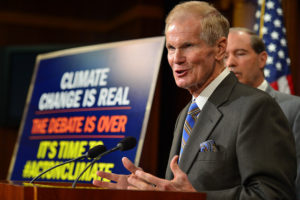
Rally to Save the Affordable Care Act, 2017
This November’s midterm elections could easily focus on Donald Trump alone. After all, this week Trump arguably moved closer to impeachment after his former attorney, Michael Cohen, pleaded guilty to crimes that implicated Trump, and former 2016 Trump presidential campaign chairman Paul Manafort was found guilty on eight financial crime counts as part of the investigation into Russia‘s interference in the 2016 elections. Even before this week, Trump has been a natural target who likes to grab the spotlight each day with an outrageous action or statement. And of course, the first midterm elections two years into a presidency naturally are a referendum on the president. However, it would be a mistake for Democrats to concentrate solely on Trump. Rather, Democrats should make this election largely about us. When Democrats do mention Trump and the Republicans, they need to talk about the pain that these opponents are causing everyday Americans in our lives, and the much better Democratic policies and vision.











